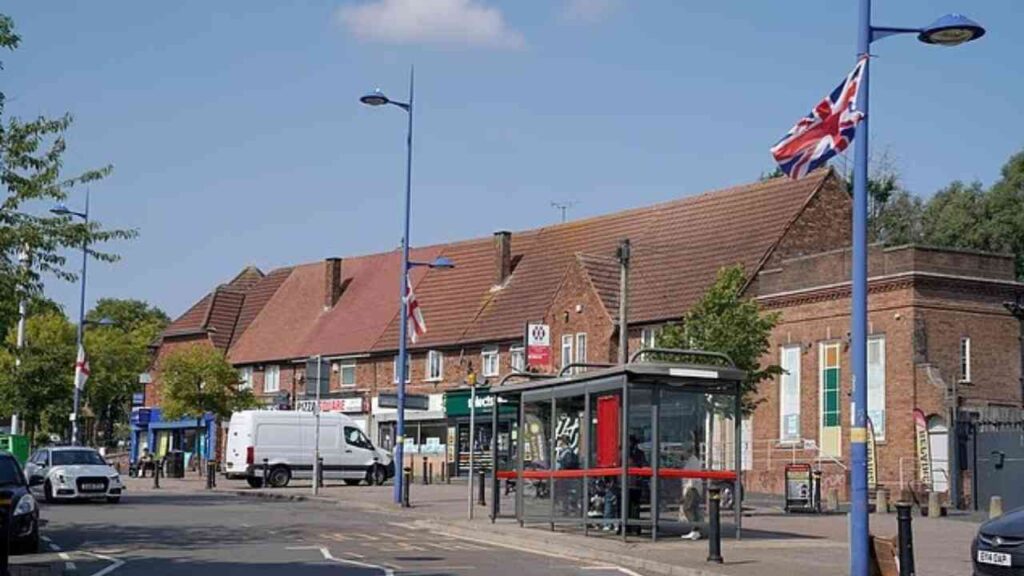Birmingham City Council has found itself at the center of a heated political controversy after ordering the removal of hundreds of Union Jack and St. George’s flags from lampposts while allowing Palestinian flags to remain displayed across the city for over 18 months.
The Flag Campaign
A grassroots group calling themselves the “Weoley Warriors” began hanging British flags from lampposts across several Birmingham neighborhoods this week, including Weoley Castle, Northfield, Selly Oak, and Bartley Green. The anonymous organizers, who describe themselves as “a group of proud English men with a common goal,” raised over £4,000 to fund their patriotic display.
Their stated mission was to “show Birmingham and the rest of the country how proud we are of our history, freedoms and achievements.” The group’s Facebook page emphasizes inclusivity, stating: “A proud community is a strong community. No matter your background, race or religion we live side-by-side in this country together, so when you look up (and) see the flags fly, they fly for you.”

Council’s Response and Safety Concerns
The Labour-controlled council moved swiftly to remove the British flags, citing safety concerns. Officials claimed that the additional weight on lampposts could “potentially lead to collapse” and posed risks to those hanging the flags, as well as motorists and pedestrians below, despite the flags being positioned approximately 25 feet above ground level.
A council spokesperson explained that they were planning lamppost upgrades that required the structures to remain free from attachments. They emphasized that “placing unauthorised attachments on street furniture, particularly tall structures like lampposts, can be dangerous.”
The Palestine Flag Disparity
The controversy intensified when critics noted that Palestinian flags have been flying from Birmingham lampposts for 18 months without similar enforcement action. When the Mail visited the predominantly Muslim Sparkhill area, seven Palestinian flags were observed on a single mile-long stretch of Stratford Road.
A leaked internal email obtained by the Mail revealed the council’s hesitancy to remove Palestinian flags without police support. Cabinet member Majid Mahmood wrote: “We are taking these down, but we need the support of the police due to issues that have cropped (up) when we first tried to take them down.”
Political Reactions
The apparent double standard has drawn sharp criticism from Conservative politicians. Shadow Justice Secretary Robert Jenrick condemned the situation as “blatant two-tier bias against the British people,” adding: “Labour-run Birmingham council seem to be ashamed of our country – celebrating everyone other than ourselves.”
Former Conservative leader Sir Iain Duncan Smith called the council’s actions “shameful,” particularly noting the timing coincided with VJ Day commemorations. Sir John Hayes referenced Birmingham’s proud heritage, suggesting that Joseph Chamberlain, whom he described as “the greatest son of Birmingham,” would be dismayed by the council’s approach.
Community Response
Local residents expressed mixed reactions to the flag removal. Helen Ingram, a historian living in Northfield, praised the community spirit the flags generated: “Everyone I’ve spoken to loves them and there’s a buzz in the air, an almost carnival-like atmosphere.”
She noted the irony that Palestinian, Ukrainian, and Pride flags “fly freely around the city every day without issue,” questioning why British flags should be treated differently.
Some community members warned that removing the flags could potentially lead to unrest, reflecting the depth of feeling the issue has generated.
Council’s Broader Context
The flag controversy comes at a particularly challenging time for Birmingham City Council, which declared effective bankruptcy in 2023. The authority is already facing intense criticism for its handling of a seven-month bin strike that has left the city’s streets covered in uncollected waste.
Adding to the perceived inconsistency, the council simultaneously announced it would illuminate the city library in Pakistani flag colors to mark Pakistan’s independence anniversary, followed by the Indian flag. Council member Majid Mahmood was photographed raising the Pakistani flag outside Council House this week.
Council’s Defense
A council spokesman stated that they had removed more than 200 unauthorized attachments from street furniture this year, including Palestinian flags, but acknowledged that some had been replaced after removal. The spokesman emphasized that staff conducting removal work should be “allowed to continue this work unhindered.”
The council maintained its position that all unauthorized attachments pose safety risks and that consistent enforcement is necessary regardless of the type of flag or symbol involved.
Opposition Leader’s Criticism
Conservative opposition leader Robert Alden called the situation “completely disgraceful,” highlighting the apparent inconsistency in enforcement. “For the last two years, the council has made little effort to remove Palestine flags and now, suddenly, residents are putting up the Union Jack and St George’s Cross and they’re saying it’s a health and safety risk – it’s madness,” he said.
Wider Implications
The controversy reflects broader tensions around national identity, community expression, and perceived double standards in local government enforcement. The incident has raised questions about how councils balance safety regulations with community sentiment and whether enforcement policies are applied consistently across different groups and causes.
The situation also highlights the challenges facing cash-strapped local authorities as they navigate politically sensitive issues while dealing with basic service delivery problems. For Birmingham residents, the flag controversy represents another example of a council that appears disconnected from community feelings while struggling to maintain essential services.
As the debate continues, the incident serves as a flashpoint for wider discussions about British identity, community pride, and the role of local government in reflecting the values of the communities they serve.






